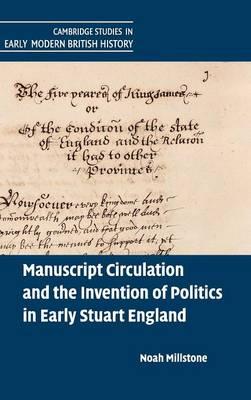Full Product Details
Author: Noah Millstone (University of Bristol)
Publisher: Cambridge University Press
Imprint: Cambridge University Press
Dimensions:
Width: 15.80cm
, Height: 2.50cm
, Length: 23.70cm
Weight: 0.670kg
ISBN: 9781107120723
ISBN 10: 1107120721
Pages: 372
Publication Date: 19 May 2016
Audience:
Professional and scholarly
,
Professional and scholarly
,
Professional & Vocational
,
Professional & Vocational
Format: Hardback
Publisher's Status: Active
Availability: Manufactured on demand

We will order this item for you from a manufactured on demand supplier.
Reviews
'In this learned and impressive book, Millstone provides scholars with such a survey [of scribal pamphleteering in the early Stuart era] and, more importantly, a persuasive argument about the different ways in which the circulation of manuscript pamphlets created, shaped and informed early modern English men and women's participation in and interpretation of politics ... a groundbreaking contribution to the study of manuscripts, politics, and practices of dissemination and interpretation. To offer a thorough account of the nature and circulation of key scribal pamphlets in early seventeenth-century England is a significant contribution to scholarship, to simultaneously provide new ways of thinking about the invention of politics in the period is a remarkable achievement.' Alison Searle, Renaissance Studies 'Millstone offers a series of compelling arguments about the nature of early Stuart politics while posing fascinating questions about the long-term origins of the English Revolution. Lucidly written, robustly argued and theoretically informed, this is one of the most impressive debuts I have read in many years. ... marvelous.' Alastair Bellany, The Spenser Review 'Noah Millstone's outstanding work supplies an invaluable survey of scribal pamphleteering during the Stuart era and provides rich new insights concerning the significance of their circulation. ... By expertly addressing the manner by which 'collectors and diarists treated the texts themselves as forming a ... political history of their own times' (167), Millstone bestows us with a modern equivalent that will prove useful to scholars with an interest in Stuart politics, regardless of their discipline.' Mark Kaethler, Renaissance Quarterly 'Millstone has produced a deeply researched and highly sophisticated book that will be of the greatest interest to scholars and students of early seventeenth-century England. He has an admirable capacity to delineate detail without ever losing sight of the broader picture. ... In guiding us elegantly through the surviving products of early Stuart scribes it whets the appetite for future works from the author's own pen.' David L. Smith, The English Historical Review
'In this learned and impressive book, Millstone provides scholars with such a survey [of scribal pamphleteering in the early Stuart era] and, more importantly, a persuasive argument about the different ways in which the circulation of manuscript pamphlets created, shaped and informed early modern English men and women's participation in and interpretation of politics ... a groundbreaking contribution to the study of manuscripts, politics, and practices of dissemination and interpretation. To offer a thorough account of the nature and circulation of key scribal pamphlets in early seventeenth-century England is a significant contribution to scholarship, to simultaneously provide new ways of thinking about the invention of politics in the period is a remarkable achievement.' Alison Searle, Renaissance Studies
Author Information
Noah Millstone is Lecturer in Early Modern History at the University of Bristol. He was educated at the University of Chicago and Stanford University, California, where he received a Ph.D. in 2011. He has held fellowships at the Huntington Library, at the Institute of Historical Research, University of London, and at the Center for History and Economics at Harvard University, Massachusetts, where he was a Prize Fellow in Economics, History and Politics between 2011 and 2014. His work has appeared in Past and Present, The Journal of British Studies, and elsewhere. This is his first book.




